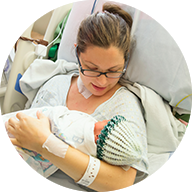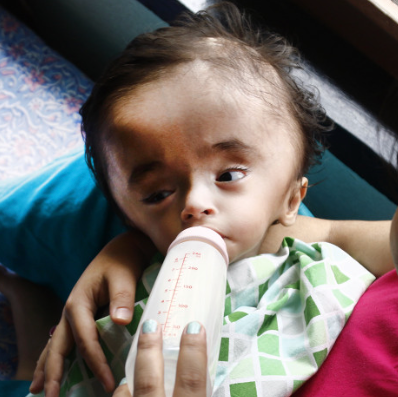In 2014 Kristen Terlizzi and her unborn son found themselves caught in a catastrophic dilemma facing maternal care. The c-section that birthed her first child two years prior caused Kristen to develop a life threatening condition in her second pregnancy called placenta accreta. Placenta accreta is a rarely discussed future risk of a cesarean where the placenta grows out of control like a cancer. It puts the mother at high risk of a massive hemorrhage when the placenta is removed. Placenta accreta is fatal for as many as 1 in 14 women.
As with most women, Kristen had never heard of placenta accreta until she was diagnosed with the complication at a routine ultrasound. More extensive imaging would go on to show that she had developed the most severe form of the condition called placenta percreta. Her placenta had grown completely through the uterus wall and had invaded her pelvic organs, including her bladder.
Shortly after diagnosis, Kristen switched care to a tertiary trauma center and was admitted into the hospital where an interdisciplinary care team was pulled together to plan her delivery. The decision was made to deliver her son over 6 weeks early. Although premature, Leo did great at birth while Kristen’s case was more severe than expected. Weeks after delivery retained placenta caused her to develop a deadly blood clotting disorder called Disseminated Intravascular Coagulation (DIC). Kristen required emergency surgery to remove the placental tissue, repair her bladder, re-implant her ureter and remove her uterus, cervix and appendix. She hemorrhaged during surgery and required transfusion of 26 units of blood products.
Kristen and Leo were lucky to survive placenta accreta, and the amount of resources and expertise it took to save their lives was staggering. Kristen spent two months postpartum in the hospital including two stays in ICU and her son spent his first month of life in the neonatal intensive care unit. Their care team included obstetricians, maternal fetal medicine specialists, gynecological oncologists, anesthesiologists, neonatologists, interventional radiologists, hematologists and infectious disease experts.
Back in 1970 cesareans accounted for 6% of United States births and placenta accreta was astonishingly rare. Today a cesarean is the most common surgery performed in the United States and accounts for 1 in 3 births. Placenta accreta rates have risen in parallel with cesarean rates and the condition currently affects around 1 in 333 pregnancies. Increasing cesareans and placenta accreta are both contributors to the sharp increase seen in United States maternal mortality and morbidity rates over the past 25 years.
After recovering from her experience, Kristen began sharing her story in order to bring attention to patient safety in maternal health and the downstream costs of cesarean deliveries. Kristen co-founded the National Accreta Foundation, www.preventaccreta.org, which seeks to eliminate preventable maternal mortality and severe maternal morbidity attributable to placenta accreta. Kristen speaks at events for medical students, hospital leadership, perinatal quality collaboratives, medical conferences and blood banks. Her medical case report is published in the official journal of the American Congress of Obstetricians and Gynecologists (ACOG) and her patient story has been featured in Vox Media, the Wall Street Journal, NPR & ProPublica’s Lost Mothers project, and People.com.







